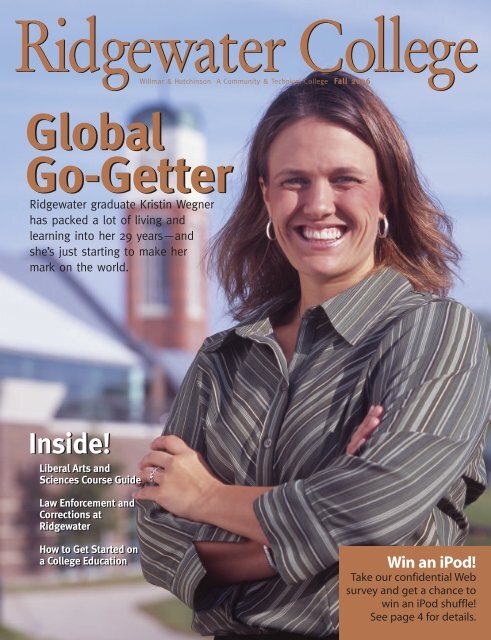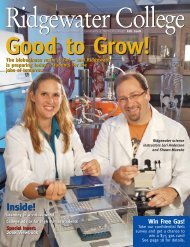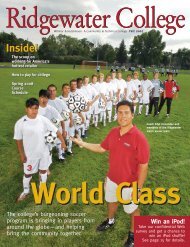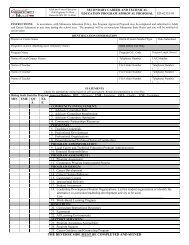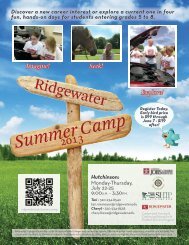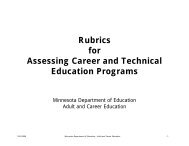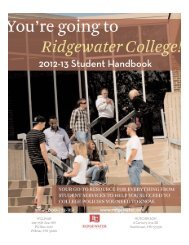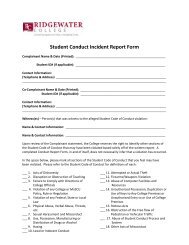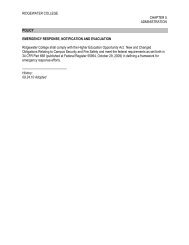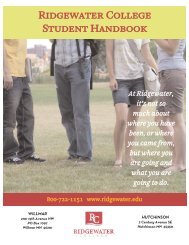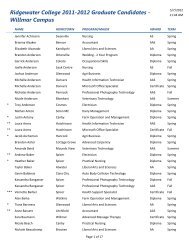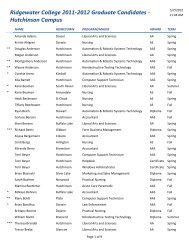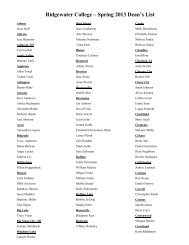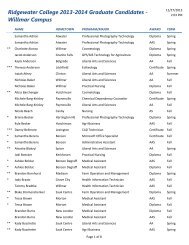RCMag_Final_F06 - Ridgewater College
RCMag_Final_F06 - Ridgewater College
RCMag_Final_F06 - Ridgewater College
You also want an ePaper? Increase the reach of your titles
YUMPU automatically turns print PDFs into web optimized ePapers that Google loves.
<strong>Ridgewater</strong> <strong>College</strong><br />
Willmar & Hutchinson A Community & Technical <strong>College</strong> Fall 2006<br />
Global<br />
Go-Getter<br />
<strong>Ridgewater</strong> graduate Kristin Wegner<br />
has packed a lot of living and<br />
learning into her 29 years—and<br />
she’s just starting to make her<br />
mark on the world.<br />
Inside!<br />
Liberal Arts and<br />
Sciences Course Guide<br />
Law Enforcement and<br />
Corrections at<br />
<strong>Ridgewater</strong><br />
How to Get Started on<br />
a <strong>College</strong> Education<br />
Win an iPod!<br />
Take our confidential Web<br />
survey and get a chance to<br />
win an iPod shuffle!<br />
See page 4 for details.
From the President<br />
How many times have you heard a relationship described as a “two-way”<br />
street? <strong>Ridgewater</strong>’s relationship with the region is one of those two-way<br />
streets where the success of the bond depends on both sides of the equation<br />
and the benefits truly flow both ways.<br />
On one side, <strong>Ridgewater</strong> <strong>College</strong> benefits<br />
from the involvement and input of<br />
engaged and committed business and<br />
community leaders—not just in our campus<br />
communities of Hutchinson and<br />
Willmar, but throughout the region. We<br />
benefit from dedicated faculty and staff<br />
who are committed to the success of our<br />
students. We benefit from students who<br />
are committed to studying and learning.<br />
We benefit from a Board of Trustees and<br />
a Chancellor committed to the welfare of<br />
Minnesota’s colleges and universities and<br />
the educational future of all Minnesotans.<br />
On the other side of the street, the<br />
region benefits from the graduates of<br />
dozens of our quality programs. It benefits<br />
from the college’s workforce and customized<br />
training programs. It benefits<br />
from the volunteerism of our faculty and staff and students—many of whom serve on<br />
church boards, school boards, community theatre boards, historical society boards,<br />
Chambers of Commerce, civic organizations such as Rotary Clubs, and dozens of<br />
other service groups. And finally, the region benefits significantly from the economic<br />
impact of our students, staff, and faculty, and the operation of the college itself.<br />
A recent economic impact study conducted by economist Paul Anton quantified<br />
some of the value of the Minnesota State <strong>College</strong>s and Universities System (MnSCU):<br />
• MnSCU’s estimated annual statewide economic impact is $3.5 billion. Of that,<br />
about $2.4 billion is from the enhanced productivity of Minnesota workers who<br />
received degrees or training at our colleges and universities.<br />
• Every state dollar spent on the MnSCU system returns close to $11 worth of<br />
economic benefits.<br />
• Capital expenditures also have a significant impact on the state’s economy.<br />
During the last four years, construction spending on our campuses has generated<br />
an average of $243 million of economic activity and the equivalent of more than<br />
2,500 full-time jobs per year in Minnesota.<br />
Those are impressive numbers, but they don’t necessarily tell the whole story. This<br />
issue features articles on <strong>Ridgewater</strong> <strong>College</strong> graduates, and illustrates the various<br />
ways that they affect and add to the quality of life here in our region—and beyond.<br />
As always, I hope you enjoy the stories, and that you will conclude, as I have, that<br />
<strong>Ridgewater</strong> <strong>College</strong>’s relationship with the region is vital and strong and goes beyond<br />
dollars and cents!<br />
Douglas W. Allen<br />
President<br />
MARK PETERSON<br />
A COMMUNITY AND TECHNICAL COLLEGE<br />
<strong>Ridgewater</strong> <strong>College</strong> is published for<br />
alumni and friends of <strong>Ridgewater</strong><br />
<strong>College</strong>, and for members of our<br />
surrounding communities.<br />
Please visit us on the Web at<br />
www.ridgewatermag.com for more<br />
information on our programs and<br />
educational offerings.<br />
Executive Editor/Director of<br />
Communications and Marketing<br />
Sam Bowen<br />
Editor<br />
Chris Mikko<br />
Design<br />
Amy Bjellos<br />
Custom Publishing Services<br />
The Coghlan Group<br />
Contributing Writers<br />
Dan Heilman, Frank Jossi, Jenny<br />
Sherman, Vicki Stavig, Liz Wolf<br />
Photography<br />
Patrick Kelly, Michael Morin,<br />
Mark Peterson<br />
Advertising/Sponsorship Sales<br />
A variety of advertising and<br />
sponsorship options are available.<br />
For more information, contact Brian<br />
Pabst, 651-644-0772, or Patti<br />
Whitehouse, 651-556-1809.<br />
Office of the President<br />
Dr. Douglas Allen<br />
President<br />
© 2006 <strong>Ridgewater</strong> <strong>College</strong>.<br />
All rights reserved.<br />
This publication is available in<br />
alternative formats upon request.<br />
<strong>Ridgewater</strong> <strong>College</strong> is an equal<br />
opportunity educator and employer.<br />
Mission Statement<br />
<strong>Ridgewater</strong> <strong>College</strong> provides quality<br />
learning opportunities for students in<br />
accessible, affordable, and supportive<br />
settings.<br />
<strong>Ridgewater</strong> <strong>College</strong> • Fall 2006<br />
1
Table of<br />
Contents<br />
“The graduates of<br />
[<strong>Ridgewater</strong>’s] law enforcement<br />
program have had a<br />
huge impact on our workforce.”<br />
page 17<br />
“[<strong>Ridgewater</strong>] provided an awesome<br />
foundation. I learned to step outside<br />
the box, to think for myself.”<br />
Front Cover:<br />
<strong>Ridgewater</strong> graduate Kristin Wegner.<br />
Photo by Michael Morin.<br />
Kristin Wegner<br />
page 14<br />
“I wanted a smaller school where the<br />
instructors knew my name.<br />
<strong>Ridgewater</strong> was right there.”<br />
page 22<br />
4<br />
12<br />
14<br />
17<br />
21<br />
Fall 2006<br />
News & Notes<br />
Computer Systems Technology program<br />
expands to the Willmar campus,<br />
new online courses offer flexibility,<br />
Machine Tool Technology gears up to<br />
meet industry demands, and more.<br />
Programs of<br />
Study<br />
Feature Story<br />
Outward<br />
Bound<br />
<strong>Ridgewater</strong> graduate Kristin Wegner<br />
has packed a lot of living and learning<br />
into her 29 years—and she’s only just<br />
begun.<br />
To Serve and<br />
Protect<br />
A look at <strong>Ridgewater</strong> <strong>College</strong>’s<br />
Professional Peace Officer and Law<br />
Enforcement/Corrections programs.<br />
Graduate<br />
Profiles<br />
Tom Anderson has come home to find<br />
a new niche for himself, Emily<br />
Randall has made a seamless move to a<br />
four-year college, and Shane Johnson<br />
is thriving in the banking industry.<br />
<strong>Ridgewater</strong> <strong>College</strong> • Fall 2006<br />
3
NEWS&NOTES<br />
On the Rebound<br />
With IT workers back in demand, <strong>Ridgewater</strong> is expanding its Computer Systems Technology<br />
program courses to the Willmar campus.<br />
Quick quiz: Can you name one of<br />
today’s fastest-growing occupations—<br />
both around the country and in<br />
Minnesota?<br />
Would you believe that it’s IT/computer<br />
support? Despite the common perception<br />
that the sector is still suffering from<br />
the post-dot-com meltdown blues,<br />
demand for IT workers—and particularly<br />
skilled computer support specialists—has<br />
increased dramatically of late. In an effort<br />
to help meet that demand and to make its<br />
Network System Administrator program<br />
available to a broader range of students,<br />
<strong>Ridgewater</strong> <strong>College</strong> is now offering<br />
Computer Systems Technology (CST)<br />
program courses on the Willmar campus<br />
this fall.<br />
“People have been discouraged from<br />
going into the field,” says Jeff Polman, an<br />
instructor in the CST program since<br />
1999. “Now there are all kinds of jobs at<br />
the entry level.”<br />
Statistics on both federal and state levels<br />
give testimony to the industry’s<br />
growth. “When we looked at statistics<br />
from both the Federal Bureau of Labor<br />
and the Minnesota Department of<br />
Employment and Economic<br />
Development [DEED], they showed that,<br />
for graduates of associate degree programs,<br />
computer support led the way in<br />
both wages and job growth,” says Mike<br />
Boehme, dean of instruction for<br />
<strong>Ridgewater</strong>’s technical programs. “DEED<br />
sees a 31 percent increase in<br />
these jobs between 2000 and<br />
2012; that’s pretty significant.<br />
And it shows a 2004 median<br />
annual wage of $62,711.”<br />
Meanwhile, Federal Bureau<br />
of Labor statistics show a<br />
median annual wage of<br />
$59,480. “When we looked at<br />
that, we thought that this is a<br />
program we need to expand,”<br />
Boehme says. “We also looked<br />
at the number of students coming<br />
from Willmar and found<br />
that we weren’t serving them as<br />
well as we could with the program<br />
only being offered in<br />
Hutchinson.”<br />
With all of that in mind, the<br />
decision to expand the accessibility<br />
of courses for the<br />
Network System Administration degree was a logical one, particularly since most computers<br />
in the business world today are networked, and security is a critical element of<br />
those systems. “Security has become a very important part of our program,” Boehme<br />
says. “On the Willmar campus we already have a Cisco program [developed by global<br />
computer giant Cisco Corp.]; four of those courses are part of the Networking<br />
degree.”<br />
CST courses will be offered through a variety of channels and at various times in<br />
hopes of making them available to full- and part-time students. Along with traditional<br />
classroom instruction, students will have access to online courses, interactive TV, and<br />
videoconferencing. Courses also will be offered during the day and in the evenings.<br />
Polman sees a strong future for students earning degrees in <strong>Ridgewater</strong>’s CST program.<br />
“The techs from our program basically have their pick of jobs,” he says.<br />
For more information on the CST program, see www.ridgewater.edu.<br />
4<br />
Get a chance to win<br />
an iPod Shuffle!<br />
Your opinions matter. <strong>Ridgewater</strong> <strong>College</strong> wants to provide a publication that fully<br />
meets your needs and expectations. Please take a few minutes to fill out our<br />
confidential online survey at www.ridgewatermag.com—and<br />
register for a chance to win an iPod Shuffle!<br />
Again, this survey is confidential. Thank you!<br />
—Vicki Stavig<br />
IMAGE COURTESY OF APPLE<br />
www.ridgewatermag.com
Forward Progress<br />
A trio of new program offerings address education and training needs in the community.<br />
NEWS&NOTES<br />
The wheels of change continue to roll at<br />
<strong>Ridgewater</strong> <strong>College</strong>. To serve the needs of<br />
our community, we’ve developed several<br />
new program offerings. Some of the more<br />
notable additions include a new Mobile<br />
Crane Operator Certification program,<br />
online business and personal interest<br />
courses, and a paramedic program.<br />
Mobile Crane Operator Certification<br />
In May 2005, Gov. Tim Pawlenty signed a<br />
law that requires all crane operators in<br />
Minnesota to be certified by July 1, 2007.<br />
<strong>Ridgewater</strong> <strong>College</strong>, in partnership with the<br />
Minnesota Highway Construction Training<br />
Group and in cooperation with the Crane<br />
Inspection and Certification Bureau, has<br />
developed a program of education and<br />
training leading to National Commission for<br />
Certification of Crane Operators (NCCCO)<br />
examinations and certification. The program<br />
is a complete package that includes<br />
both the written and practical exams,<br />
together with the opportunity to prepare<br />
for both. <strong>Ridgewater</strong> is an approved<br />
NCCCO Site Coordinator, and has already<br />
completed its inaugural program in March<br />
with good results. Pass rates for the written<br />
and practical exams were 98 percent<br />
and 88 percent, respectively.<br />
• SpendSmart<br />
• and many others; see<br />
www.ridgewater.edu/customized for<br />
more information.<br />
Paramedic program<br />
Emergency care in central Minnesota will<br />
undergo some exciting changes this winter<br />
with the advent of a new paramedic program<br />
at <strong>Ridgewater</strong>. Emergency Medical Technicians<br />
(EMTs) will have an opportunity to expand<br />
their skills and become trained paramedics.<br />
Paramedics have more advanced skills than<br />
EMTs, including intubation and the ability to<br />
administer a wider range of medications.<br />
The program will begin in the spring 2007<br />
semester. Classes will meet on Monday and<br />
Wednesday evenings, and on one Saturday<br />
per month. Interested individuals should<br />
contact Bev Hartzburg at 320-222-6063.<br />
—Liz Wolf<br />
MARK PETERSON<br />
From left, Bev Hartzburg, CCCE program coordinator;<br />
Russ Olson, CCCE program coordinator;<br />
and Brad Hanson, Willmar Ambulance.<br />
Upcoming class commencement dates are:<br />
• Dec. 4, 2006<br />
• March 12, 2007<br />
• June 11, 2007.<br />
Online courses<br />
Online educational opportunities are continuing<br />
to grow in popularity nationwide.<br />
The Center for Customized and Continuing<br />
Education has been busy developing several<br />
online training options for 2006-2007<br />
that will provide an effective and efficient<br />
way to train individuals and employees.<br />
Specifically, online education allows for<br />
flexibility in where the training is conducted,<br />
the pace of the training, and when the<br />
training occurs. It’s also affordable, and<br />
can reduce or eliminate many travel costs<br />
involved with training.<br />
Online training programs include:<br />
• Lean Manufacturing (series)<br />
• Supervision and Leadership (series)<br />
• Invest in Your Debt<br />
<strong>Ridgewater</strong> <strong>College</strong> • Fall 2006<br />
5
NEWS&NOTES<br />
Machine Scene<br />
<strong>Ridgewater</strong> <strong>College</strong>’s Machine Tool Technology program prepares students for the dynamic<br />
and expanding world of precision machining.<br />
When Kenton Schaefer graduated from<br />
<strong>Ridgewater</strong> <strong>College</strong>’s Machine Tool<br />
Technology program in 2003, he was<br />
only 20 years old. He was, however,<br />
solidly prepared. His <strong>Ridgewater</strong> training<br />
and education helped him quickly<br />
land a job at Hutchinson-based 3D<br />
CNC Inc., where today he’s a CNC<br />
(computer numerically controlled) operator<br />
and programmer. “The program<br />
touches on all the bases and offers a<br />
good head start,” Schaefer says.<br />
He’s not exaggerating. <strong>Ridgewater</strong>’s<br />
program offers hands-on experience,<br />
state-of-the art equipment—including<br />
CAD/CAM and CNC machines—and<br />
experienced instructors to train students<br />
for the rigorous demands of the manufacturing<br />
industry, says Mike Boehme,<br />
dean of technical programs. It prepares<br />
students for such high-tech jobs as<br />
diemakers, moldmakers, and CNC<br />
technicians, all of whom produce precision<br />
metal parts used in everyday consumer<br />
products.<br />
Boehme adds that the program,<br />
which recently relocated to<br />
<strong>Ridgewater</strong>’s main Hutchinson campus,<br />
provides students with high-tech CNC<br />
and CAD/CAM training as well as fundamental<br />
machinery skills, including<br />
use of mills, grinders, lathes, and drill<br />
presses. “We want to prepare students<br />
for the types of jobs available today in<br />
the machining industry in Minnesota<br />
and beyond,” he explains.<br />
machine tool instructor, says placement opportunities for machinists are outstanding.<br />
In fact, the National Tooling & Machining Association estimates that there is a<br />
shortage of 25,000 to 30,000 skilled manufacturing workers in the United States.<br />
Bomstad adds that most companies offer excellent wages and competitive benefit<br />
packages. “Our students who graduated in spring 2006 are averaging $15 an hour,”<br />
he says, adding that top hourly wages can be $30 or more. “The job market’s there.<br />
The pay’s there. The opportunities are unbelievable.”<br />
Students in <strong>Ridgewater</strong>’s Machine Tool program receive technical skills training to<br />
work in industrial machining. Coursework includes introduction to CAM, blueprint<br />
reading, computer foundations, and first aid/safety, among other classes. These<br />
courses are combined with general education classes, including physics, composition,<br />
and introduction to communications, for a well-rounded education.<br />
<strong>Ridgewater</strong> offers eight career options, including two-year degrees, diplomas, certificates,<br />
and customized classes.<br />
<strong>Ridgewater</strong> grads also work in every area of manufacturing, including machine operation,<br />
plant management, and machine tool sales. “This is a hands-on, creative industry,”<br />
Edwards says. “They’re not boring assembly-line jobs. It’s fast-paced work.”<br />
—Liz Wolf<br />
For more information on the Machine Tool program, see www.ridgewater.edu.<br />
Instructors Dan Edwards (left) and Dale Bomstad are preparing <strong>Ridgewater</strong> Machine Tool<br />
Technology program graduates for careers in a high-demand industry.<br />
Certification<br />
<strong>Ridgewater</strong> is also a newly certified<br />
Mastercam (state-of-the-art machining<br />
software) training facility. “We worked<br />
toward the certification for two years,”<br />
says Machine Tool Instructor Dan<br />
Edwards. “Only six schools nationwide<br />
are qualified. When our students apply<br />
for jobs, employers will see they’ve had<br />
this rigorous training, and it’ll get them<br />
ready to succeed right out of the door.”<br />
Dale Bomstad, another <strong>Ridgewater</strong><br />
PAT KELLY<br />
26<br />
www.ridgewatermag.com
NEWS&NOTES<br />
The Power of 10<br />
Ten years after a trio of local institutions merged to form <strong>Ridgewater</strong>, the<br />
college is celebrating a decade of accomplishments and service to its<br />
communities. And this is only the start.<br />
During the past 10 years, <strong>Ridgewater</strong><br />
<strong>College</strong> has undergone a number of big<br />
changes, evolving into an institution that<br />
is meeting the educational needs of an<br />
increasing student population and also<br />
helping drive the area’s economy. The<br />
catalyst for that evolution was the 1996<br />
merger of Willmar Community <strong>College</strong><br />
and the Hutchinson-Willmar Area<br />
Technical <strong>College</strong>s to form <strong>Ridgewater</strong><br />
<strong>College</strong>.<br />
“One of the challenges was to create<br />
the notion of one college with two campuses<br />
out of what was three colleges in<br />
two communities,” says <strong>Ridgewater</strong><br />
President Dr. Douglas Allen. “There were<br />
huge opportunities as well. Probably the<br />
most significant was that the merger<br />
allowed us to offer an associate of arts<br />
degree in Hutchinson.”<br />
<strong>Ridgewater</strong>’s accomplishments during<br />
the past decade are numerous and include<br />
the creation of two state-of-the-art simulation<br />
laboratories for the Nursing program<br />
on both campuses. “They have<br />
allowed us to better serve the healthcare<br />
industry, which is important because we<br />
have a lot of people coming to<br />
<strong>Ridgewater</strong> for retraining,” Allen says.<br />
The college also has strengthened its ability to<br />
serve students of all ages and backgrounds, thanks in part to a<br />
five-year, $1.25 million Trio Grant used to provide tutoring and other services<br />
to students who are from low-income families, are the first in their families to<br />
attend college, or have a disability. “We’ve increased accessibility to a college education<br />
for many students in the area,” Allen says. He adds that <strong>Ridgewater</strong> students also have<br />
benefited from an increase in articulation agreements with four-year colleges and universities<br />
throughout the state, many of which accept technical, as well as general education,<br />
credits.<br />
The merger also changed the mix of educational programs offered<br />
on both campuses. “Hutchinson was almost all technical courses when the merger<br />
took place,” says Betty Strehlow, <strong>Ridgewater</strong>’s vice president of Academic Affairs and<br />
Student Services. “We’ve added more general education courses, so now it’s approximately<br />
50/50 between technical and general education.”<br />
What will the next 10 years bring? “I can see us expanding in certain areas,” Allen<br />
says. “I think we’ll be moving much more broadly into a variety of delivery methods,<br />
including online courses. One of the huge things we’ll see, especially in Willmar—<br />
which is 23 to 25 percent Latino—is a growing diversity. We’ll need to adapt in order<br />
to serve that population and be accessible to it.”<br />
Allen also expects <strong>Ridgewater</strong>’s role in the area’s economic development to continue<br />
to grow. “I see us expanding in what we do in healthcare, for example,” he says.<br />
“There will be a huge call to expand in nursing, community health, EMS, early responders,<br />
and paramedics to meet increasing healthcare needs. <strong>Ridgewater</strong> also has the<br />
largest agriculture program among two-year colleges in the state. Our region is still<br />
very agriculturally driven, and I think we’ll find ourselves growing and adapting to<br />
meet the needs of people in that industry, including alternative fuels as the energy<br />
crunch continues.”<br />
—Vicki Stavig<br />
<strong>Ridgewater</strong> <strong>College</strong> • Fall 2006<br />
7
NEWS&NOTES<br />
RIDGEWATER FILE PHOTO<br />
One Step Ahead<br />
<strong>Ridgewater</strong>’s membership in the CIHSEP partnership is helping position Minnesota<br />
as a healthcare leader.<br />
<strong>Ridgewater</strong>’s two simulation centers make<br />
extensive use of simulation mannequins and<br />
supporting technologies.<br />
“We need to produce more nurses,<br />
but the clinical experience is<br />
limited to 10 students.”<br />
It’s a well-known fact that there’s a national shortage<br />
of nurses. According to the latest statistics, here in<br />
Minnesota alone, 2,400 registered nursing and 1,100<br />
practical nursing positions are unfilled—and the<br />
number of vacant positions is expected to double by<br />
2008.<br />
That’s just one challenge being addressed by the<br />
Center for Integrated Health Science Education and<br />
Practice (CIHSEP), of which <strong>Ridgewater</strong> <strong>College</strong> is a<br />
member. CIHSEP is a joint partnership of education,<br />
industry, and community created to transform healthcare<br />
education and delivery across the state. CIHSEP<br />
was awarded $3 million to help position Minnesota<br />
as a leader in healthcare education, research, practice,<br />
and innovation.<br />
Taking the lead<br />
<strong>Ridgewater</strong>, recognized for its progressive work in<br />
healthcare simulation, is taking a lead in CIHSEP by<br />
heading the organization’s simulation study group.<br />
Simulation training offers nurses and healthcare<br />
teams the opportunity to learn the complete range<br />
of likely medical experiences they’ll find in practice.<br />
“The military and aviation have used simulation for<br />
years. Healthcare simulation is up and coming,” says<br />
Robert Cannon, <strong>Ridgewater</strong>’s vice president of<br />
Customized and Continuing Education. “<strong>Ridgewater</strong>’s<br />
two simulation centers use simulation mannequins<br />
and supporting technologies that allow students to<br />
work within scenarios they may encounter in a ‘live’<br />
setting in their professional work. Simulation makes<br />
for a safe environment to make mistakes and learn<br />
practices—without the risks of ‘practicing’ on<br />
humans.”<br />
<strong>Ridgewater</strong>’s role in CIHSEP is assessing healthcare<br />
simulation in Minnesota—how it’s used, who’s<br />
using it, and how it should best be used. CIHSEP,<br />
for example, is examining how simulation technology<br />
could help remedy the clinical bottleneck in nursing. “We need to produce more nurses,<br />
but the clinical experience is limited to 10 students,” Cannon says, adding that, by<br />
some estimates, hundreds of people are on waiting lists for registered nursing and<br />
practical nursing programs statewide. “We need to think creatively. One example would<br />
be using simulation to supplement the clinical experience, which could as much as<br />
double the number of local nurses produced.”<br />
Lynn Johnson, <strong>Ridgewater</strong>’s director of nursing, says CIHSEP is<br />
well-positioned to help Minnesota advance the use of healthcare<br />
simulation. “We’re looking at gaps in its use and making recommendations,”<br />
she says, noting that students benefit significantly from the<br />
technology. “They do things they’d only observe in clinical settings.<br />
You learn by doing and by making mistakes.”<br />
—Liz Wolf<br />
8<br />
www.ridgewatermag.com
NEWS&NOTES<br />
Attention <strong>Ridgewater</strong> Alumni! We want to keep in touch with you.<br />
The <strong>Ridgewater</strong> <strong>College</strong> Foundation is trying<br />
to locate as many of its alumni as<br />
possible. If you are a graduate of our<br />
college, we hope you will take a few<br />
moments to complete our Alumni Profile<br />
Update online at www.ridgewater.edu or<br />
fill out the information requested on this<br />
page and mail to:<br />
<strong>Ridgewater</strong> <strong>College</strong> Foundation<br />
PO Box 1097<br />
Willmar, MN 56201<br />
The information you provide will be<br />
made available to classmates planning<br />
reunions or just wanting to stay in touch.<br />
<strong>Ridgewater</strong> <strong>College</strong> and the <strong>Ridgewater</strong><br />
<strong>College</strong> Foundation office will also use the<br />
information to keep you informed of special<br />
events and opportunities at the college.<br />
Although you may have graduated from<br />
Hutchinson Technical <strong>College</strong>, Willmar<br />
Technical <strong>College</strong>, or Willmar Community<br />
<strong>College</strong> before we merged, you are still<br />
<strong>Ridgewater</strong> <strong>College</strong> alumni. We are eager<br />
to connect with you, and are anxious to<br />
tell you about the great things happening<br />
at your alma mater!<br />
Name ________________________________ Maiden Name __________________________<br />
Address ______________________________________________________________________<br />
City ________________________________________ State __________ Zip ___________<br />
Telephone ___________________________ E-mail ___________________________________<br />
*Birthdate or SSN ______________________________________________________________<br />
Employer ______________________________ Address ________________________________<br />
Occupation ____________________________________________________________________<br />
Graduated? Y N Year Graduated ____________<br />
Program Attended _________________________________ Years Attended _________<br />
Is your spouse a graduate of <strong>Ridgewater</strong>? Y N Year Graduated ________<br />
Spouse’s name _________________________________ Program _______________________<br />
To avoid duplication of information, please list others in your household who can be combined with<br />
your address.<br />
Other ______________________________________ Year Graduated ________________<br />
*<strong>Ridgewater</strong> is asking for information that is private and/or confidential, which you are not required to<br />
provide under state/federal law.<br />
<strong>Ridgewater</strong> <strong>College</strong> • Fall 2006<br />
9
NEWS&NOTES<br />
Ready, Set, Go!<br />
How can you get started at <strong>Ridgewater</strong> <strong>College</strong>?<br />
Read on for a step-by-step guide.<br />
One of our goals at <strong>Ridgewater</strong> is to make it as easy as possible for you<br />
to attend college. With that in mind, check out the following information,<br />
which details what you need to know and do to get started at<br />
<strong>Ridgewater</strong> <strong>College</strong>.<br />
Step #1<br />
Learn about <strong>Ridgewater</strong><br />
Experiencing <strong>Ridgewater</strong> firsthand is the<br />
best way to learn about all the college has<br />
to offer. Schedule a campus visit and we’d<br />
be happy to show you around, introduce<br />
you to instructors, and answer questions. If you<br />
can’t make it in person, visit our Website, or call<br />
800-722-1151 for more information.<br />
?FAQs<br />
Will my credits transfer?<br />
<strong>Ridgewater</strong> <strong>College</strong> bases its general education programs<br />
on the Minnesota Transfer Curriculum (MnTC).<br />
This program enables a student to receive credit for all<br />
lower-division general education upon admission to any<br />
other Minnesota State <strong>College</strong>s and Universities institution.<br />
The University of Minnesota also recognizes the<br />
MnTC as fulfilling the lower-division general education<br />
component of its degree programs. Many private and<br />
out-of-state public colleges also regularly accept<br />
<strong>Ridgewater</strong> general education credits on a case-by-case<br />
basis. <strong>Ridgewater</strong> <strong>College</strong> has many resources to help<br />
students with the process of transferring credits to<br />
another institution.<br />
Can I afford college?<br />
Yes, you can! People often think that college is out of<br />
their reach. This is simply not true. While you may not<br />
be able to pay for your college education “out of pocket,”<br />
there are many financial aid options available to<br />
those in need. <strong>Ridgewater</strong> strives to be an affordable<br />
option for achieving quality higher education.<br />
Will I get to work “hands-on?”<br />
The curriculum in <strong>Ridgewater</strong>’s technical programs features<br />
a large amount of hands-on activity. More importantly,<br />
that activity takes place using the latest technology<br />
and equipment that is the same as what’s being<br />
used in industry today. It’s this type of training that has<br />
made <strong>Ridgewater</strong> <strong>College</strong> a great recruiting ground for<br />
potential employers.<br />
What grades do I need in high school to be<br />
admitted?<br />
<strong>Ridgewater</strong> <strong>College</strong> has an “open door” admissions policy.<br />
If you have graduated from high school or obtained<br />
your GED, you are eligible for admission to the college.<br />
You are not required to have graduated high school<br />
with a minimum GPA, or to have finished with a specific<br />
class rank.<br />
Step #2<br />
Apply<br />
It’s easy! All you have to do: Fill out and<br />
submit an application along with the $20<br />
application fee. You will also need to make<br />
arrangements to forward your high school or<br />
college transcript to <strong>Ridgewater</strong>.<br />
What if I don’t know what I want to major in?<br />
No problem! You are not required to select a certain<br />
major to begin taking classes at <strong>Ridgewater</strong>. In fact, this<br />
is a great place to get exposure to different areas of<br />
study to help determine where your future interests lie.<br />
If you do know what you want to study, we can get you<br />
started down the right path: taking classes that cover<br />
general education requirements, but which are also relevant<br />
to your major.<br />
Can I take just a few classes?<br />
Yes. Many people take only one or two classes each<br />
semester. You can either work on a part-time basis with<br />
the goal of graduating with a degree, diploma, or certificate,<br />
or you can take individual classes that interest<br />
you from a personal or professional development standpoint.<br />
10<br />
www.ridgewatermag.com
NEWS&NOTES<br />
Step #3<br />
Step #4<br />
Investigate financial aid<br />
and scholarship options<br />
<strong>Ridgewater</strong> <strong>College</strong> offers many different forms<br />
of financial assistance to those in need, including<br />
grants, loans, and scholarships.<br />
Visit www.ridgewater.edu to examine your options<br />
and apply for aid.<br />
Attend an Orientation-<br />
Advising-Registration (OAR)<br />
session<br />
All new students attend a <strong>Ridgewater</strong> OAR session.<br />
This is the real start to your college experience at<br />
<strong>Ridgewater</strong>. During these sessions, you will become<br />
familiar with <strong>Ridgewater</strong>, determine what courses will<br />
meet your goals, and register for your first-semester classes.<br />
Most students seeking a degree, diploma, or certificate also<br />
will need to take a basic skills assessment test prior to<br />
enrolling in the <strong>College</strong>.<br />
Important Terms<br />
!<br />
Admission<br />
You are admitted to the college once you<br />
have successfully met all of the admission<br />
requirements, which then allows you to<br />
take classes and work toward a degree,<br />
diploma, or certificate. Some programs,<br />
however, require additional criteria before<br />
you are allowed to enter them and take<br />
classes, and some programs have limited<br />
admission space.<br />
Community college<br />
Community colleges offer lower-division<br />
instruction, usually two years or less, in<br />
academic and occupational programs, many<br />
of which transfer to four-year universities.<br />
Enroll<br />
Once you have registered for courses and<br />
paid your tuition and fees, you are enrolled<br />
at the <strong>College</strong>.<br />
Liberal arts and sciences<br />
Liberal arts and sciences courses address<br />
knowledge of the important concepts and<br />
principles of the natural sciences, mathematics,<br />
history, social and behavioral sciences,<br />
and the arts and humanities. These<br />
classes focus on developing students’ general<br />
knowledge and reasoning ability in<br />
such areas as critical thinking, communication,<br />
and inquiry. They also foster an appreciation<br />
of diverse people, cultures, and life<br />
roles. These courses, according to<br />
Minnesota state statute, must transfer to a<br />
four-year university.<br />
Technical college<br />
Technical colleges offer lower-division<br />
instruction, usually two years or less, in<br />
technical and occupational programs that<br />
are typically used to gain immediate<br />
employment.<br />
Step #5<br />
Start classes!<br />
For more information, go to www.ridgewater.edu<br />
or call 800-722-1151.<br />
Transfer of credits<br />
This is an official process supervised by a<br />
college transfer specialist to advise in the<br />
transfer of credits earned at one college or<br />
university to a degree, diploma, or certificate<br />
program at a different college or university.<br />
Transfer of credit is determined by<br />
the receiving institution.<br />
<strong>Ridgewater</strong> <strong>College</strong> • Fall 2006<br />
11
Programs of Study<br />
<strong>Ridgewater</strong> <strong>College</strong><br />
Liberal Arts<br />
and Sciences Programs<br />
Get your first two years of a four-year degree here!<br />
<strong>Ridgewater</strong> offers a wide variety of course options in liberal arts and sciences. These general education<br />
programs are based on the Minnesota Transfer Curriculum (MnTC) to ensure easy transfer to<br />
any public university in Minnesota. Students who are undecided on a major can take a variety of<br />
courses to explore their interest, all while working toward a liberal arts degree. Individuals who<br />
know what they want to major in can build a schedule to get them off to a strong start in a specific<br />
field of study. <strong>Ridgewater</strong> can help you on your way to any of the following majors:<br />
Accounting<br />
Agriculture<br />
2006<br />
Art<br />
Biological Sciences<br />
Business<br />
Administration/Management<br />
Chemical Dependency<br />
Counseling<br />
Chemistry<br />
Computer Science<br />
Economics<br />
Elementary/Secondary/<br />
Special Education<br />
English<br />
History<br />
Human Services/Social<br />
Services/Gerontology<br />
Law Enforcement/Corrections<br />
Liberal Arts<br />
Mass Communications<br />
Mathematics<br />
Mortuary Science<br />
Music<br />
Nursing<br />
Philosophy<br />
Physical Education/<br />
Health/Recreation<br />
Political Science<br />
Pre-Accounting<br />
Information Systems<br />
Pre-Airway Science<br />
Pre-Chiropractic<br />
Pre-Dentistry<br />
Pre-Law<br />
Pre-Medical Technology<br />
Pre-Medicine<br />
Pre-Nursing<br />
Pre-Occupational Therapy<br />
Pre-Optometry<br />
Pre-Pharmacy<br />
Pre-Physical Therapy<br />
Pre-Veterinary Medicine<br />
Psychology<br />
Radiologic Technology<br />
Sociology<br />
Speech/Theatre Arts<br />
For more information on any<br />
of these programs, contact<br />
<strong>Ridgewater</strong> at 800-722-1151,<br />
or go to www.ridgewater.edu.<br />
12<br />
www.ridgewatermag.com
Programs of Study<br />
<strong>Ridgewater</strong> <strong>College</strong><br />
Technical Programs<br />
These programs, which range anywhere from nine months to two years, are designed to provide<br />
detailed, focused training for quick entry into a specific career field. Technical programs at<br />
<strong>Ridgewater</strong> <strong>College</strong> give students the opportunity to learn in a hands-on environment, using stateof-the-art<br />
equipment and technology. Our instructors are experienced both inside and out of the<br />
classroom, so you’ll know what to expect when you begin your career.<br />
(H)—offered on the Hutchinson campus<br />
(W)—offered on the Willmar campus<br />
Automotive<br />
Health Services<br />
Business<br />
Auto Body Collision Technology (W) Health Information Technician (W)<br />
Accountant (H)(W)<br />
Advanced Collision Services (W)<br />
Medical Administrative Secretary (H)(W) Accounting Technician (H)(W)<br />
Auto Mechanics Technology (W)<br />
2006<br />
Manufacturing<br />
Machine Tool Technology (H)<br />
Welding Technology (H)(W)<br />
Computer-Aided Drafting and Design (H)(W)<br />
Computers<br />
Business and Computer Systems<br />
Management (H)<br />
Computer Programmer (H)<br />
Computer Support Technician (H)<br />
Network Systems Administration (H)<br />
Technology<br />
Audio Technology (H)<br />
Automated Systems Engineering<br />
Technology (H)<br />
Medical Assistant (W)<br />
Medical Coding Specialist (W)<br />
Nursing (H)(W)<br />
Radiologic Technology (W)<br />
Nursing Assistant (H)(W)<br />
Human Services<br />
Activity Director/Activity Assistant (H)<br />
Educational Assistant (H)<br />
Universal Care Assistant (H)<br />
Law Enforcement (W)<br />
—Corrections<br />
—Professional Peace Officer<br />
Occupational Skills (W)<br />
Agriculture<br />
Agri-business (W)<br />
Agricultural Education (W)<br />
Administrative Assistant (H)(W)<br />
Marketing and Sales Management (H)(W)<br />
Marketing and Design (H)<br />
Legal Administrative Assistant (H)(W)<br />
Insurance Claim Representative (W)<br />
Small Business Management (H)(W)<br />
Construction<br />
Carpentry (W)<br />
Electrician (W)<br />
Visual Arts and Communications<br />
Professional Photography (W)<br />
Computer Art and Publishing (W)<br />
—Creative Emphasis<br />
—Technical Emphasis<br />
Multimedia Design Technology (H)<br />
Web Design Technology (H)<br />
Calibration Engineering Technology (H)<br />
Electronics Technology (W)<br />
Wireless Communications Technology (W)<br />
Nondestructive Testing Technology (H)<br />
Agronomy Technology (W)<br />
Dairy Management (W)<br />
Farm Operations/Management (W)<br />
GPS/GIS Technology for Agriculture (W)<br />
Computer Publishing (W)<br />
Health and Beauty<br />
Cosmetology (W)<br />
Veterinary Technology (W)<br />
Nail Technician (W)<br />
Farm Business Management (H)(W) Estheology (W)<br />
Massage Therapy (W)<br />
<strong>Ridgewater</strong> <strong>College</strong> • Fall 2006<br />
13
Outward<br />
Bound<br />
<strong>Ridgewater</strong> graduate Kristin Wegner has<br />
packed a lot of living and learning into<br />
her 29 years—and she’s just starting to<br />
make her mark on the world.<br />
BY VICKI STAVIG<br />
PHOTOGRAPHS BY MICHAEL MORIN<br />
Kristin Wegner<br />
14<br />
www.ridgewatermag.com
“It’s been an amazing journey.”<br />
So says Kristin Wegner, a Willmar<br />
native who earned her associate of arts<br />
degree in liberal arts from <strong>Ridgewater</strong><br />
<strong>College</strong> in 1997. Since then, she not only<br />
went on to earn a master’s degree, but<br />
also spent two years as a volunteer with<br />
the Peace Corps in the Eastern European<br />
country of Moldova.<br />
Today Wegner is a visiting instructor at<br />
Grand Valley State University in<br />
Allendale, Mich., where she teaches in<br />
the Department of Movement Services.<br />
The road that led to that position has<br />
been both fascinating and exciting—and<br />
the journey isn’t nearly over.<br />
First steps<br />
Active throughout high school in everything<br />
from gymnastics to cheerleading to<br />
the National Honor Society, Wegner<br />
brought that energy and commitment to<br />
<strong>Ridgewater</strong>. She was involved in a range<br />
of activities, including membership in Phi<br />
Theta Kappa and the <strong>Ridgewater</strong> <strong>College</strong><br />
Peer Helpers, and served as volunteer<br />
coordinator for the college’s Native<br />
American Awareness Gathering. “I got<br />
involved in many things and met people<br />
from outside the area,” she says. “It was<br />
great for finding out who you are and<br />
trying to reach your dreams.”<br />
Wegner credits the college with setting<br />
the stage for her future accomplishments.<br />
As early on as her elementary school<br />
years, she says knew that she and her two<br />
brothers, Joe and Jon, would attend<br />
<strong>Ridgewater</strong> (then known as Willmar<br />
Community <strong>College</strong>). “My parents<br />
believed we would get a good foundation<br />
there, which turned out to be true,” she<br />
says. “It was an awesome foundation. I<br />
learned to step outside the box, to think<br />
for myself.”<br />
After graduating with honors from<br />
<strong>Ridgewater</strong>, she enrolled at Minnesota<br />
State University–Moorhead, with a goal<br />
of finding a career that would allow her<br />
to work with children. She eventually settled<br />
on physical education, and in 1999<br />
graduated cum laude from Moorhead<br />
with a bachelor of science degree in physical<br />
education and a minor in coaching.<br />
Along the way, she also took special education<br />
classes at Minnesota State<br />
University–Mankato and earned a license<br />
in developmental and adapted physical<br />
<strong>Ridgewater</strong> <strong>College</strong> • Fall 2006<br />
15
education. “Phy-ed was a natural fit,” she says. “I loved working with kids; I have a<br />
passion for it. I’d also had the opportunity to work with children with disabilities. My<br />
mother is a teacher and had taught adapted classes, and throughout high school I had<br />
volunteered with disabled kids.”<br />
Her first post-graduation stop was in New London-Spicer, where she taught physical<br />
education and health education for a year while coaching gymnastics. She liked the<br />
job, but admits that it wasn’t entirely fulfilling. “I knew I was missing something,” she<br />
says. “I was attracted to different cultures and wanted to work abroad.”<br />
Not long after that realization, she came across an ad that would radically change<br />
her direction. “I got an e-mail about the Peace Corps,” she says. “I sent in my application<br />
the next day. It usually takes from three months to a couple years to process the<br />
application and get accepted, so I decided to stop teaching. I didn’t want to leave in the<br />
middle of the school year if I got accepted.”<br />
Needing to support herself, however, Wegner headed to the Twin Cities, where she<br />
worked as a mortgage analyst for Wells Fargo Home Mortgage. “I told them that<br />
when and if the Peace Corps called, I’d be leaving,” she says.<br />
Chapter two<br />
When the call came in May 2001, Wegner plunged into a new chapter in her life. “My<br />
recruiter said, ‘I have the perfect spot for you: Moldova,’” she recalls. “He said I<br />
would be working as a health education volunteer.”<br />
It was an exciting time, and Wegner was eager to get started—perhaps a little too<br />
eager, as it turned out. “I had a friend who tutored me in Russian for two months,” she<br />
notes. “Then I found out that in Moldova, the national language is Romanian,<br />
although some people do speak Russian.”<br />
The next step was an<br />
intense 11-week training<br />
program that immersed her<br />
‘’<br />
“I knew I was missing something.<br />
I was attracted to different<br />
cultures and wanted to<br />
work abroad.”<br />
in the country’s language<br />
and culture. By August,<br />
she was sworn into the<br />
Peace Corps, flown to<br />
Europe, and placed smack<br />
in the middle of Moldova,<br />
working in the communities<br />
of Draguseni,<br />
Dachnovici, and Bobeica.<br />
“I had to assess each community’s needs, implement a health education curriculum in<br />
the schools, and teach courses,” she says. “I was the first Peace Corps volunteer there<br />
and worked with a local counterpart. Everything we did we wanted to be sustainable,<br />
so the counterpart could carry on after I left.”<br />
It was not an easy job. “More than half of all of the parents in the communities were<br />
working somewhere else and weren’t there for their children,” Wegner says. “So they<br />
needed to be taught life skills, along with health education that addressed issues such as<br />
HIV, AIDS, hygiene issues, smoking, and alcohol.”<br />
One of the most disturbing issues Wegner encountered, however, was human trafficking<br />
for purposes of prostitution or slavery, which has emerged as a serious problem<br />
in the poorer parts of Eastern Europe over the last decade. It was an unsettling realization<br />
for her, and she says she was driven to do what she could to alert children and<br />
parents about trafficking’s dangers. She eventually even found herself dealing firsthand<br />
with a trafficking attempt. While at the airport in Bucharest, Romania, Wegner noticed<br />
a young woman with an older man. Something bothered her about the pair; they<br />
didn’t seem to fit with each other. So she approached the girl while the man was talking<br />
on the phone. “Where are you going?” Wegner asked the young woman. “On<br />
vacation,” came the reply. But after talking to the girl and earning her trust, Wegner<br />
discovered that this was indeed a case of trafficking and convinced the young woman<br />
to leave the man. “My major accomplishment was stopping that woman from being<br />
trafficked,” she says. “We had to address that issue in our classes, too—that people are<br />
going to use you and abuse you. We had<br />
to make children aware that [traffickers]<br />
will lure them by saying they’ll bring<br />
them to a better place to live, which is<br />
appealing because [a lot of people] want<br />
to leave their impoverished areas.”<br />
Wegner also made her mark in establishing<br />
a peer education team. “I trained<br />
kids who ended up training other kids in<br />
more than 20 communities,” she says.<br />
“Then other Peace Corps volunteers<br />
asked me to come and teach teams for<br />
them. We traveled throughout the country<br />
and trained these teams. These were<br />
bright kids; they could speak Romanian,<br />
French, and Russian.”<br />
There were, of course, other accomplishments<br />
along the way. One was<br />
Wegner’s co-coordination of Odyssey<br />
of the Mind, an international creative<br />
problem-solving competition for students<br />
from kindergarten through college.<br />
Wegner also had the opportunity to do<br />
some traveling on her own, visiting much<br />
of Europe during her breaks.<br />
Wegner says the experience helped her<br />
grow as a person. “Whatever I put into it,<br />
I got more out of it,” she says. “It was the<br />
relationships and the people that were<br />
important. It helped me see that we all<br />
come from different backgrounds, but<br />
we’re all part of the human race. It also<br />
reinforced that we have so much here [in<br />
the United States].”<br />
When Wegner returned to the United<br />
States in 2003, she was eager to continue<br />
her education. She earned a master of science<br />
degree in human development at the<br />
University of Maine in 2005, while also<br />
working in the college’s kinesiology<br />
department. These days, she continues to<br />
teach and works part-time in marketing<br />
for an engineering firm. As for next steps,<br />
she says she hopes to continue her studies<br />
and earn a Ph.D. and again work with<br />
children. The possibilities, she says, are<br />
endless and could include one day working<br />
as dean of a community college, a<br />
country director with the Peace Corps, or<br />
as a manager of an international youth<br />
service foundation. “My life is based on<br />
callings,” she says. “Everything I’ve done<br />
has led me to something I didn’t imagine.<br />
I am so intrigued with culture and people<br />
and exploring.”<br />
Vicki Stavig is a Bloomington-based<br />
freelance writer.<br />
16<br />
www.ridgewatermag.com
ToServe<br />
and<br />
Protect<br />
RIDGEWATER COLLEGE’S PROFESSIONAL PEACE OFFICER AND CORRECTIONS PROGRAMS<br />
HAVE A PROUD HISTORY OF TURNING OUT WELL-TRAINED GRADUATES. AND THOSE<br />
GRADUATES ARE FINDING A WEALTH OF OPPORTUNITY IN THE WORKPLACE THESE DAYS.<br />
By Frank Jossi<br />
Photographs by Patrick Kelly<br />
Just four months into his first job as the only police officer in Walnut Grove, a<br />
30-mile drive southwest of Marshall, Mike Zeug faced a serious law-enforcement<br />
challenge. A Walnut Grove man had slain his ex-girlfriend, an extremely rare<br />
crime in a town where only 600 or so people live, and Zeug was quickly thrown into<br />
his first major criminal investigation.<br />
Operating off what he learned in peace officer classes at <strong>Ridgewater</strong> <strong>College</strong> just a<br />
few months earlier, he made calls to the Redwood County sheriff and the state’s<br />
Bureau of Criminal Apprehension (BCA) to alert both parties to the fact that a murder<br />
suspect had fled the scene. As other officers arrived from different departments in<br />
the area, a manhunt began and soon afterward a local tri-county emergency response<br />
unit found the suspect in a patch of trees next to the apartment where the shooting<br />
occurred. The man surrendered without a struggle just four hours after the shooting<br />
and was later booked for the crime in Redwood County.<br />
“The BCA field agent and the other police personnel spent six hours after the arrest<br />
getting all this stuff down,” says Zeug of the 2006 murder case. “They told me, ‘Mike,<br />
you did a great job, there’s no other way you could have handled it.’ Usually suspects<br />
are on the run a reasonable amount of time, but in this case we got him quickly.”<br />
The Walnut Grove police chief and solo officer credits his 2005 law<br />
enforcement/professional peace officer degree from <strong>Ridgewater</strong>, along with a summer<br />
skills course at Alexandria Technical <strong>College</strong>, for preparing him for a job that involves<br />
cases as extraordinary as a murder and as common as traffic tickets and domestic disturbance<br />
calls. “The skills course taught me how to handle a scene and what not to<br />
touch,” he explains. “At <strong>Ridgewater</strong> I learned more technical stuff and how to apply<br />
common sense to different situations.”<br />
Diversity matters<br />
<strong>Ridgewater</strong> offers several different law enforcement-related degree programs that have<br />
provided police departments throughout the state with hundreds of police officers over<br />
the past several decades. (See “Degree Options” at right for more information.)<br />
Criminal justice system jobs range from probation and parole officers to community<br />
corrections and corrections’ counseling positions. “There’s a real growth in jobs<br />
for students on the corrections track,” says Mike Kutzke, the Law Enforcement program<br />
coordinator and a 1986 <strong>Ridgewater</strong> graduate. “As society gets tougher on criminals,<br />
we’re finding that the field is growing exponentially.”<br />
The courses aren’t only about law enforcement, however. “We have a nice mix of<br />
Degree<br />
Options<br />
Prospective corrections<br />
and peace officer<br />
students have several<br />
different options at<br />
<strong>Ridgewater</strong>. They are:<br />
• Law Enforcement/Corrections—<br />
AA degree<br />
• Law Enforcement/Professional<br />
Peace Officer Education—AA degree<br />
• Law Enforcement/Professional<br />
Peace Officer Education—AAS<br />
degree<br />
For more information, go to:<br />
www.ridgewater.edu.<br />
liberal arts courses, to give students a<br />
background in that area, along with law<br />
enforcement courses,” Kutzke says. “For<br />
example, we’ll have a course such as<br />
Psychology of Law Enforcement to help<br />
students prepare for the day-to-day activities<br />
in law enforcement and get them<br />
ready for the more serious psychological<br />
and emotional challenges they will face.<br />
<strong>Ridgewater</strong> <strong>College</strong> • Fall 2006<br />
17
Jim Kulset<br />
18<br />
www.ridgewatermag.com
‘’“The<br />
graduates of the college’s law enforcement program have had a<br />
huge impact on our workforce.”<br />
The information in this course is the kind<br />
they’ll use throughout their career.”<br />
As Minnesota’s population has grown<br />
increasingly diverse in recent years,<br />
police officers and corrections personnel<br />
have had to learn how to deal with a<br />
wide range of different cultures.<br />
<strong>Ridgewater</strong> has addressed that trend by<br />
requiring students to take a sociology<br />
course called Race and Cultural<br />
Minorities. The emphasis has proven particularly<br />
useful for officers working in<br />
both cities and small towns. Zeug points<br />
out that more than one-third of the residents<br />
in Walnut Grove are Hmong, and<br />
the murder he dealt with involved a<br />
Hmong suspect and victim. “When the<br />
murder happened, we reached out to the<br />
Hmong community and got help from<br />
it,” he recalls. “That’s how we were able<br />
to find [the suspect] in only four hours.”<br />
In the pipeline<br />
Willmar Police Chief Jim Kulset graduated<br />
from <strong>Ridgewater</strong>, then known as<br />
Willmar Junior <strong>College</strong>, in 1976. After a<br />
brief stint in Morris as a police officer, he<br />
joined the Willmar force and moved up<br />
the ranks, serving as a uniformed officer,<br />
detective, and detective sergeant (“pretty<br />
much everything but dog catcher,” he<br />
says with a laugh) before being appointed<br />
chief seven years ago. He still remembers<br />
a course he took taught by Willmar City<br />
Attorney Richard Ronning. “It was a<br />
criminal law course, and it was tough,”<br />
he says. “But I learned a lot of practical<br />
applications of the law in that course that<br />
I have used many times.”<br />
Kulset regularly looks to his alma<br />
mater when hiring new employees for his<br />
19-officer department. “The last time I<br />
checked I found that a little over 50 percent<br />
of our licensed police officers were<br />
<strong>Ridgewater</strong> graduates,” says Kulset, who<br />
has also taught at <strong>Ridgewater</strong> as an<br />
adjunct professor. “The graduates of the<br />
college’s law enforcement program have<br />
had a huge impact on our workforce.”<br />
Although a year or two usually goes<br />
by without any job openings on the<br />
<strong>Ridgewater</strong> <strong>College</strong> • Fall 2006<br />
Willmar Police Department, Kulset says he had six positions to fill in 2005. Three of<br />
his hires for those positions were <strong>Ridgewater</strong> graduates. What’s more, Kulset’s department<br />
also established an apprentice program with <strong>Ridgewater</strong> that allows four students<br />
to work part- and full-time as “community service officers” for two years while<br />
handling such issues as animal control, parking violations, and other work that does<br />
not necessarily require the skills of licensed police officers.<br />
Willmar’s not the only police department loaded with <strong>Ridgewater</strong> alumni, either.<br />
Kandiyohi County Sheriff Dan Hartog says his department has “hired quite a few<br />
graduates from the <strong>Ridgewater</strong> program. They come with a good, solid education.”<br />
At least half the department’s 33 officers have <strong>Ridgewater</strong> degrees, adds Hartog, a<br />
1980 <strong>Ridgewater</strong> graduate who serves on an advisory board for law enforcement programs<br />
at the college.<br />
According to Hartog, the strength of the college’s program lies in its use of real<br />
police practitioners as adjunct professors to speak to what police officers in the field<br />
face on a daily basis. The program is coordinated by Kutzke, who has a rich background<br />
in police work, says Hartog. Students prefer taking courses from instructors<br />
who have seen recent action in the field, rather than from those who rely on memories<br />
of what it was like years ago to work in the field.<br />
Another <strong>Ridgewater</strong> advantage is the small learning environment, notes Hartog.<br />
The classes are small, professors get to know students, and vice versa. “It’s small<br />
enough where if you want to interact with instructors there is time to do that, which<br />
makes a difference,” he says. “You can get one-on-one help if you need it.”<br />
Justice Is Served<br />
A new program allows students to take SCSU Criminal<br />
Justice courses on <strong>Ridgewater</strong>’s Willmar campus.<br />
<strong>Ridgewater</strong> <strong>College</strong> is teaming up with St. Cloud State University (SCSU) to make<br />
courses in Criminal Justice available on the Willmar campus.<br />
Instead of attending classes in St. Cloud, students can get junior-, senior-, and<br />
graduate-level course instruction from SCSU faculty at the <strong>Ridgewater</strong> campus,<br />
and through interactive television and online options. Students have SCSU identification<br />
cards and pay SCSU tuition. The program is ideal for law-enforcement<br />
and corrections students and for people who want to advance their education<br />
but who don’t want to move or commute to St. Cloud.<br />
The program is also the first of its kind in Minnesota. “<strong>Ridgewater</strong> President<br />
Doug Allen and Vice President Betty Strehlow have been instrumental in bringing<br />
the program to <strong>Ridgewater</strong>,” says Sheree Morgan, an adjunct SCSU faculty member<br />
and the program’s coordinator. “They have provided SCSU with technology<br />
support, classrooms, and office space at <strong>Ridgewater</strong>. We’re pleased to be able to<br />
work together and help meet the educational needs for the people in this<br />
region.”<br />
For more information about the program, contact Sheree Morgan at 320-222-7612,<br />
or sheree.morgan@ridgewater.edu.<br />
19
Dan Hartog<br />
One challenge for <strong>Ridgewater</strong> law enforcement candidates has been the desire by<br />
many to achieve a bachelor’s degree but the reluctance to relocate to attend a fouryear<br />
institution. The nearest four-year college, Saint Cloud State University<br />
(SCSU), is 60 miles away.<br />
This issue has begun to<br />
‘’<br />
“[<strong>Ridgewater</strong>] is small<br />
enough where if you want to<br />
interact with instructors there<br />
is time to do that, which<br />
makes a difference.”<br />
change, however, with the<br />
arrival of Sheree Morgan,<br />
a <strong>Ridgewater</strong> grad who<br />
recently received a master’s<br />
degree in criminal<br />
justice from SCSU.<br />
Morgan, who worked for<br />
years as a state probation<br />
officer in Chisago County,<br />
is creating a distancelearning<br />
program that will<br />
connect <strong>Ridgewater</strong> students<br />
with courses on the SCSU campus through on-site lectures, videoconferencing,<br />
and other means.<br />
The relationship is on the edge of a growing movement toward linking community<br />
college graduates with opportunities at four-year institutions in their regions,<br />
says Bob Prout, chair of the criminal justice program at SCSU. “On the whole, our<br />
best students are older, they’re working, they’re not 18 years old,” he says, noting<br />
that the description fits many of <strong>Ridgewater</strong>’s students. “They’re trying to get a<br />
degree done and they work hard at it.” (For more information on the program, see<br />
“Justice Is Served” on page 19.)<br />
Zeug was one of those older students.<br />
He drove semi-trailers for more than a<br />
decade before deciding, at the age of 34,<br />
to change careers and get into law<br />
enforcement. He saved $5,000 for<br />
tuition, took out loans for another<br />
$10,000, and earned some money on the<br />
side working as a mechanic while he<br />
attended <strong>Ridgewater</strong>.<br />
Today he’s living just nine miles from<br />
where he grew up. He enjoys a position<br />
where he meets new people every week<br />
and faces different situations every day.<br />
He’s also committed to doing proactive<br />
policing by keeping in close touch with<br />
community members to deter crime<br />
before it happens. “Like anyone else,<br />
you complain about things once in a<br />
while,” he says. “But you’re helping out<br />
your community in a job like this, and<br />
that’s what I like about it. It’s much different<br />
than the other jobs I’ve had.”<br />
Frank Jossi is a St. Paul-based freelance<br />
writer.<br />
20<br />
www.ridgewatermag.com
graduate profile<br />
Back to the Future<br />
After working in a variety of industries at different<br />
places around the country, Tom Anderson has found<br />
a niche—right back where he started.<br />
By Dan Heilman<br />
If Tom Anderson’s story is any indication, you can go home again. Since graduating<br />
from <strong>Ridgewater</strong> <strong>College</strong>, the Willmar native has worked in some diverse industries<br />
and spent several challenging but rewarding years on the East Coast. These days,<br />
however, he’s back in his hometown, working as an attorney with Willmar-based<br />
Johnson, Moody, Schmidt & Kleinhuizen PA (JMS&K), and particularly pleased to be<br />
on familiar ground again.<br />
“It’s a great part of the state to grow up in,” he says. “I always wanted to return to<br />
this area because I enjoy hunting, fishing, and golfing—activities that are readily available<br />
here.”<br />
Anderson practices in the area of civil litigation, personal injury, and criminal law for<br />
the six-attorney firm, which he joined in December 2005. And like his decision to return<br />
to central Minnesota, his path to a legal practice had roots in his upbringing. “I had an<br />
uncle and a grandfather who were attorneys in the southern part of the state, in Le<br />
Sueur,” Anderson says. “I always knew I was going to pursue it, since the two things I<br />
was really good at were writing and talking, and this job requires plenty of both.”<br />
Roundabout<br />
Anderson’s route back to Willmar was a<br />
circuitous one. After studying at<br />
<strong>Ridgewater</strong> and eventually earning a<br />
bachelor’s degree from Concordia<br />
<strong>College</strong> in Moorhead, he worked in<br />
radio, helping with the conversion of<br />
Willmar’s KKLN-FM (94.1) from a classic<br />
country format to classic rock. From<br />
there, he was accepted into the law program<br />
at the New England School of Law,<br />
where he earned his juris doctorate degree<br />
in May 2005. While in Boston, he made<br />
ends meet by working in the insurance<br />
business and as an IT consultant.<br />
Tom Anderson<br />
PATRICK KELLY<br />
<strong>Ridgewater</strong> <strong>College</strong> • Fall 2006<br />
21
After earning his J.D., Anderson got in touch with the late Bill Thompson, who was<br />
a partner at JMS&K, and once the ball started rolling, it was an easy decision to come<br />
to work for the firm. “I knew the firm had a solid reputation with a proven ethical<br />
background, as well as very sharp attorneys,” Anderson says.<br />
As for the ups and downs he experienced on his road back to Willmar, Anderson<br />
says it was all worthwhile. “I wouldn’t trade it for the world,” he notes. “It was a challenge.<br />
The firm I worked for in Boston, Darwin Partners, specialized in getting tech<br />
startups off the ground. At that time, IT was a declining market—it was right when the<br />
balloon popped. We were unproven, but you have to sell yourself and work really hard<br />
to get people excited about it.”<br />
Anderson, 30, has fond memories of <strong>Ridgewater</strong>, and appreciates the nudge he<br />
received from many of the faculty there. Among memorable mentors at <strong>Ridgewater</strong>, he<br />
says that Sam Nelson in the History department, Lori Park-Smith in Sociology, and<br />
several others helped ignite a passion for learning and a desire to excel. “It was a great<br />
place to get started,” he says. “I was an underachiever in high school. That changed<br />
when I went to college—I became interested.”<br />
As for his current work, Anderson describes it as “basic criminal and personal injury<br />
cases—not anything groundbreaking, just trying to help people who need help.”<br />
One memorable case he worked on involved a hunting club that was trying to resist<br />
a residential development adjacent to its property. “We didn’t get the outcome we<br />
wanted, but I got to see how law and politics<br />
intersect on issues like this,” he says.<br />
“We went before the county board, dealt<br />
with the zoning administrator, and filed a<br />
writ of mandamus [a judicial order directing<br />
a government official to perform a<br />
duty of his or her office], which was<br />
somewhat extraordinary. We were trying<br />
to compel a public body to do something<br />
we felt it had to do. There wasn’t a lot of<br />
precedent [for that].”<br />
Anderson lives in Willmar with his<br />
wife, Jessica Falk, who’s a dentist. In his<br />
free time, he does everything he can to<br />
take advantage of the outdoors. “Golf<br />
takes up all my free time in the summer,<br />
and hunting in the fall,” he says with a<br />
laugh.<br />
Dan Heilman is a St. Paul-based freelance<br />
writer.<br />
graduate profile<br />
Smooth Sailing<br />
Emily Randall credits <strong>Ridgewater</strong> with preparing her<br />
for a seamless move to a four-year institution.<br />
By Jenny Sherman<br />
As a five-year-old, Hutchinson native and recent <strong>Ridgewater</strong> <strong>College</strong> graduate<br />
Emily Randall (now 21) aspired to be a cheerleader. In grade school, her career<br />
choice was to be a teacher, and by high school she was toying with the notion<br />
of becoming an actress.<br />
But, by the end of high school, she was no closer to being settled when it came to<br />
deciding what step to take next. “I wasn’t really prepared, didn’t research a lot of different<br />
schools, didn’t know the processes,” says Randall, who also didn’t like the idea<br />
of going to a big state school with a reputation for hard-partying students. “I wasn’t<br />
looking to go to a university at that point in my life.”<br />
So she took a year off and worked at a department store near Hutchinson while she<br />
mulled over her options. Before the year was out, she knew she had to continue with<br />
school. “I didn’t want to get caught working paycheck-to-paycheck,” Randall says.<br />
“And I didn’t want to work at a department store my entire life. I was very, very, very<br />
ready to get back into school.”<br />
She also had clearer ideas about which school to attend. “I wanted a smaller school<br />
where the instructors knew my name,” she says. “<strong>Ridgewater</strong> was right there.”<br />
She enrolled in 2003, and initially considered going down the graphic design track. A<br />
conversation with her mother led her to opt for an English curriculum, so she sampled<br />
a semester’s worth of classes in the liberal arts. Before the end of the term, she knew<br />
she’d found her direction.<br />
With the fire for literature lit, Randall<br />
started investigating how to pursue a<br />
four-year English degree. A professor at<br />
<strong>Ridgewater</strong> who had attended Augsburg<br />
<strong>College</strong> lauded that school’s English<br />
offerings and encouraged Randall to find<br />
out more. For the first time, she says, she<br />
thought about transferring and completing<br />
an associate’s degree in order to do so.<br />
“I was set on Augsburg as soon as I heard<br />
about it,” says Randall. “I had already<br />
taken a handful of courses. I had a list of<br />
courses that were transferable. I started<br />
taking those classes and thought: Why<br />
not just earn a two-year degree and transfer<br />
in as a junior?”<br />
So Randall signed up at <strong>Ridgewater</strong> as a<br />
full-time student pursuing an associate’s<br />
degree in liberal arts and sciences. She<br />
also participated in the school’s work<br />
22<br />
www.ridgewatermag.com
study program. “I don’t know if I could have<br />
done college without work study,” she says.<br />
“It was a great deal.”<br />
In spring of 2006, she graduated from<br />
<strong>Ridgewater</strong> with a high GPA and as a member<br />
of the Phi Theta Kappa Honor Society. This<br />
fall, she seamlessly transferred to Augsburg,<br />
where she was awarded a special $12,500 Phi<br />
Theta Kappa scholarship specifically for transfer<br />
students. She’ll again be participating in a<br />
work study program, this time as a circulation<br />
assistant in Augsburg’s library. “I’m going to<br />
climb the education ladder as high as I can<br />
go,” she says, noting that she’ll be focusing on<br />
literature and dabbling in creative writing. “I’d<br />
really like to do both, but until I can make<br />
time to talk to an advisor, I’m heading down<br />
the lit path.”<br />
Her career goals are still varied, but now<br />
focus on English-related fields: magazine editing,<br />
writing, perhaps even teaching as a college<br />
professor. She credits the new direction she’s<br />
discovered for her career—as well as the foundation<br />
for that path—to <strong>Ridgewater</strong>. “I spoke<br />
at commencement when I graduated,” she<br />
says. “I told the audience and all the students<br />
who graduated with me that I thought<br />
<strong>Ridgewater</strong> was a really solid stepping-stone<br />
for students who might not be ‘traditional students’—maybe<br />
they took some time off,<br />
maybe their parents got laid off. It was an<br />
excellent experience.”<br />
PATRICK KELLY<br />
Jenny Sherman is a New York City-based freelance<br />
writer.<br />
Emily Randall<br />
graduate profile<br />
Close to Home<br />
Timely advice and hometown support helped launch<br />
Shane Johnson into a successful career in the banking<br />
industry.<br />
By Dan Heilman<br />
It’s typical for banks to advertise themselves as customer-focused these days, but<br />
that’s a claim Shane Johnson makes on behalf of Bremer Bank of Willmar with<br />
absolute certainty. Johnson, the branch manager of the Bremer Cash Wise Grocery<br />
location, makes a point of being service-oriented, and says he can’t imagine any other<br />
way of doing business.<br />
“Banking is a very competitive industry,”<br />
Johnson says. “One way to stay<br />
competitive is to offer competitive product<br />
to our clients. We’re always striving<br />
to meet our customers’ needs. We’re not<br />
just order-takers.”<br />
<strong>Ridgewater</strong> <strong>College</strong> • Fall 2006<br />
23
Shane Johnson<br />
Johnson, 30, has been with Bremer since 2001. At its Cash Wise location, he oversees<br />
nine employees and coordinates the branch’s everyday business, which includes insurance<br />
and investment planning along with the usual deposits and loans.<br />
Johnson’s route to this point wasn’t a direct one. A Willmar native, Johnson was typical<br />
in that he wasn’t certain where his career path would lead once he was out of high<br />
school. All that changed when he went to <strong>Ridgewater</strong>, however.<br />
Transition<br />
“I had a guidance counselor at <strong>Ridgewater</strong> named Arlen Sjerven,” Johnson says. “He<br />
gave me the idea of going into a business-related field. Banking was something that had<br />
always interested me anyway—the idea of working with a lot of different facets of the<br />
business world—so his suggestions had a strong impact on me.”<br />
Johnson also says his experience at <strong>Ridgewater</strong> made the process of leaving the nest<br />
much easier. “The college helped me make the transition because it was in my hometown,”<br />
he says. “Some of my friends also went there, and so I was able to make that<br />
step. It gave me time to discover what I wanted to do with the rest of my life. The<br />
comfort level was there so I could take time and figure out what I wanted to do without<br />
having to move away from home.”<br />
PATRICK KELLY<br />
Johnson earned an associate of arts<br />
degree from <strong>Ridgewater</strong>, then a bachelor’s<br />
degree in finance (with a marketing/economics<br />
minor) from Minnesota State<br />
University–Mankato. “<strong>Ridgewater</strong> was<br />
perfect for my situation at the time, and<br />
it’s also good for people going back to<br />
school,” he says. “If I had it to do over<br />
again, I’d go right back.”<br />
After college, Johnson spent two and a<br />
half years working for the Willmar<br />
branch of CitiFinancial, starting as a lending<br />
officer before moving up to branch<br />
manager. From there he moved over to<br />
Bremer. “For me, it boiled down to how<br />
much work I wanted to put into it,”<br />
Johnson says. “I came here working with<br />
loans and deposits, and worked my way<br />
into a management role by going above<br />
and beyond, and showing interest in<br />
other opportunities that came up. I took<br />
the time to learn the business and how<br />
the bank worked. When other roles<br />
opened up, I made it clear that I wanted<br />
to try new things.”<br />
Johnson’s stewardship over the Cash<br />
Wise branch has helped Bremer Bank of<br />
Willmar continue as a strong presence in<br />
the community. Today, the bank, which<br />
recently moved its main offices from its<br />
longtime downtown spot to a new 3 1 /2-<br />
acre location on the east side of town,<br />
boasts assets of more than $225 million<br />
and a proud local history. Bremer Bank<br />
of Willmar opened in 1876 as the Bank of<br />
Willmar, and is the longest continuously<br />
running business in Kandiyohi County.<br />
The Otto Bremer Foundation, the bank’s<br />
charitable arm, is also active in the area.<br />
Away from work, Johnson enjoys fishing,<br />
spending time with his family, and<br />
following Minnesota sports teams. His<br />
wife, Linnae, is program director for a<br />
human-services organization in Willmar,<br />
and they have two daughters, 10-year-old<br />
Hailey and baby Myah, who was born<br />
early in 2006. Johnson also volunteers for<br />
Habitat for Humanity of Western<br />
Minnesota and serves on the Willmar Fest<br />
board, in addition to coaching Hailey’s<br />
basketball team at the YMCA. “I also just<br />
got into playing the guitar,” he says.<br />
“Hailey is learning along with me, and<br />
she’s already better than I am.”<br />
Elsewhere in this issue, Dan Heilman<br />
profiled <strong>Ridgewater</strong> graduate Tom<br />
Anderson.<br />
24<br />
www.ridgewatermag.com
2101 15th Ave. N.W.<br />
Willmar, MN 56201


